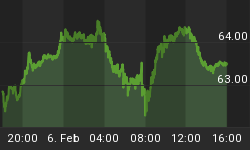Unlike old soldiers economic fallacies refuse to fade away. Nouriel Roubini, former Clinton White House economist and now a professor of economics, has been busy telling the Bloomberg business news service that the economy is heading for a severe downturn that will be worse than the 2001 recession. Like the vast majority of economists Roubini bases his analysis on Keynesian phantasmagoria.
In his view " the U.S. will experience a systemic financial crisis", though he does admit that at 5 per cent of GDP a deteriorating housing market is too small to trigger a recession. Nevertheless, because consumption is more than 70 per cent of GDP a decline in consumer spending would "trigger a full-blown recession". As evidence of this view he states that the heavily indebted consumer may have reached the point where he will need to reign in his spending.
Roubini's views need to be carefully considered because they echo the received wisdom that consumer spending is the road to higher living standards. But as the classical economists explained, consumer demand springs from production, meaning you cannot consume what has not been produced. Therefore when consumers demand goods they are in effect exchanging what they produced for the products of other consumers. This is why the classical school considered money to be a veil that concealed the process of production and exchange from the public eye.
If Roubini and his fellow Keynesians were right it would follow that the Great Depression (the Democrats' favourite economic disaster story) would have been preceded by a fall in consumer spending leading to a contraction in the production of consumer goods. This contraction would have then worked its way up the production structure, hitting the heavy capital goods industries last. Instead, the depression was preceded by a continuous fall in manufacturing output that started some 6 months beforehand.
In 1929 the consumer goods production index stood at 100. Come 1932 it had fallen to 70, rising to 77 in 1933 from which time it continued to grow. Bad as these figures are they are dwarfed by what happened to the capital goods industries where production dived from 100 in 1929 to 32 in 1932, rising to 38 in 1933. (Frederick C. Mills, Prices in Recession and Recovery, The National Bureau of Economic Research, Inc., New York, 1936, p. 418). During this catastrophic contraction real wage rates continued to rise.
Any reader with a passing knowledge of Austrian economics will immediately realise that these economic data are easily explained by Austrian analysis. Roubini fares no better with his reference to the 2001 recession (which really started 1999). If it were otherwise consumer spending would have fallen followed in time by a drop in manufacturing output. In fact consumer spending continued to rise during the recession while the recession in manufacturing had clearly emerged in 1999. And it was in manufacturing that the great drop in spending occurred.
The ISM's (Institute of Supply Management) Performance Manufacturing Index (PMI) provided the figures that helped me track US manufacturing in 1999. Today's figures are not good, neither are they dreadful. In February the PMI was 48.3, down from 50.7 in January. (Anything below 50 is considered a contraction). The figure for July was 50. This does not mean that the US will avert a recession, only that at the moment the situation is nowhere as dire as the Democrats and their political activists in the media would have you believe.
Roubini correctly states that housing is about 5 per cent of GDP as against 70 per cent for conception. The problem here is that GDP greatly understates total spending because it omits spending among firms on the grounds that this would be double-counting. (Try telling that to a manufacturer that has to pay for these inputs). Once we include this inter-firm spending we find that economic activity probably exceeds $30 trillion. For those who think this approach is a serious error, I should point out that the American Bureau of Economic Analysis also takes account of inter-firm spending.
Therefore, by aggregating all spending we discover that consumer spending drops to about 33 per cent of total spending. Thus we must conclude that it is business spending that really drives the economy. To argue otherwise is to commit an egregious error.
Roubini expresses deep concern about the level of consumer debt. Like all Keynesians he missies the vital fact that the ultimate source of this excess credit is not money on loan to banks by their clients but the Federal Reserve's destructive monetary policy.
Until the Keynesian orthodoxy is overthrown and the monetary actions of central banks have been properly analysed the so-called trade cycle will continue to be a recurring feature of our economic landscape.















